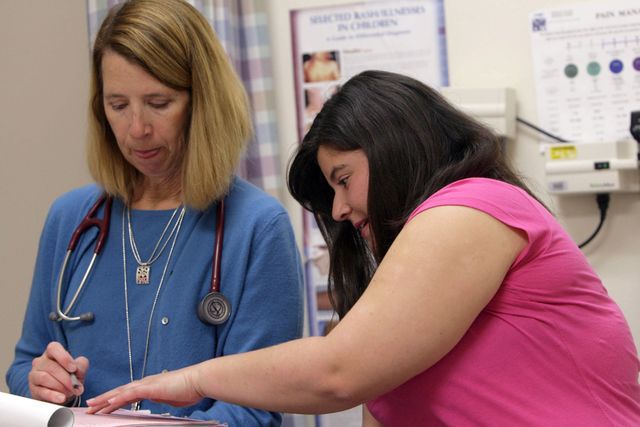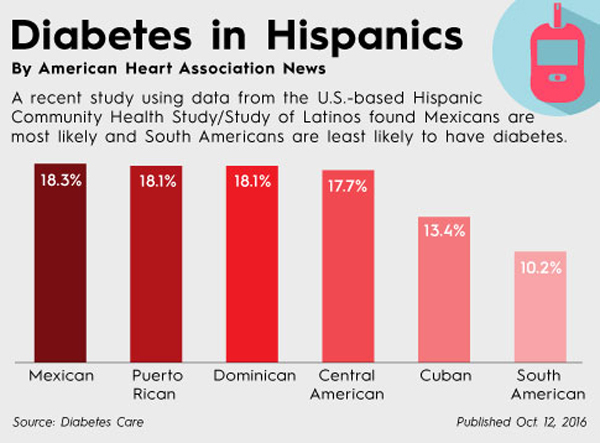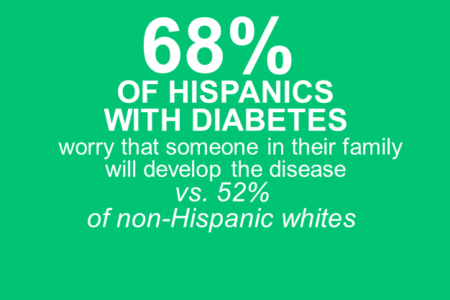
Share On Social!
Even if you’re thin, you might be genetically at risk for diabetes.
A new study, led by the University of North Carolina at Chapel Hill’s Gillings School of Global Public Health, examined data from 9,000 Latino adults ages 21-76 and found that a well-known gene variant linked to Type 2 diabetes—transcription Factor 7-like 2 (TCF7L2) gene—also may predispose a person to being leaner.
Individuals with the TCF7L2 gene variant may be at risk for Type 2 diabetes even while maintaining a low body weight.
The findings is novel, given many individuals with diabetes are obese.
“The counterintuitive discovery that some people are predisposed both to being thin and developing Type 2 diabetes refocuses our attention on the need to collect data in diverse populations and across time,” said study leader Dr. Kari North of UNC in a press release. “Latinos are a diverse and understudied population, so this study is an important step forward for understanding their health risks.”
The New Study
The underlying genetic basis for mortality likely involves complex interactions with factors related to ethnicity, Type 2 diabetes, and body weight.
In North’s study, researchers used complex modeling to looked at the impact of a specific complex gene variant on changes in body mass index. They then estimated the odds of Type 2 diabetes across time.
The study will help scientists use genetic information to understand the causes of diabetes and obesity and their relationship to each other.
“Also, a clinician’s radar [for diabetes] typically will be triggered when an individual is obese, but perhaps not so much when seeing someone who is lean. In reality, based upon our findings, the lean person, depending on his or her genetic composition, may still be at risk for Type 2 diabetes,” North said.
The Current State of Latinos & Diabetes
 Latino children and adults are disproportionately affects by obesity.
Latino children and adults are disproportionately affects by obesity.
They also are disproportionately affected by diabetes.
In fact, 1 in 2 Latinos are at risk for developing type 2 diabetes at some point in their lifetime.
Latinos are also more likely to experience complications from the disease and, according to the U.S. Department of Health & Human Services (HHS) Office of Minority Health. They have a higher death rate from diabetes, too.
Yet few prediabetes and diabetes prevention programs exist for this high-risk population.
Individuals with prediabetes can still take important steps to prevent from seeing the disease progress into diabetes. One important step is getting referred to a diabetes prevention program. However, of 84 million individuals with prediabetes, only 11.6% are aware they have this condition.
 North’s recent study can lead to personalization in medication and help clinicians offer better treatment and advice on adopting healthy lifestyles. Hence, it is critically important that ethnically diverse groups like Latinos participate in these type of research and clinical trials, since disease impact and the effectiveness of treatment varies according to gender, age, genetic background, lifestyle and other factors.
North’s recent study can lead to personalization in medication and help clinicians offer better treatment and advice on adopting healthy lifestyles. Hence, it is critically important that ethnically diverse groups like Latinos participate in these type of research and clinical trials, since disease impact and the effectiveness of treatment varies according to gender, age, genetic background, lifestyle and other factors.
Participation in clinical trials is a moral imperative for ethnically diverse communities as one’s participation can not only open doors to improving one’s own health, but can benefit many others in one’s own community.
That’s why we’re excited to use #SaludTues on Oct. 16, 2018, to tweet chat about how to increase Latino participation in clinical trials to prevent health disparities.
Community Education
 Prioritizing your health is crucial for diabetes control and prevention.
Prioritizing your health is crucial for diabetes control and prevention.
Often, for Latinos, preventing or managing diabetes comes down to household and cultural norms, says Adlia Ebeid, PharmD, the director of pharmacy services at the San José Clinic in Houston. Hence we need more community education and awareness for the disease among Latinos.
Campaigns also can help spread the word.
- San Antonio took part in Diabetes Alert Day in March 2017.
- A nurse built a diabetes self-management education program in the Coastal Region of North Carolina.
- Legendary Spanish-language TV host Don Francisco helped launch a new campaign to dispel diabetes and insulin treatment myths.
What can you do?!
Explore More:
Healthcare AccessBy The Numbers
142
Percent
Expected rise in Latino cancer cases in coming years



